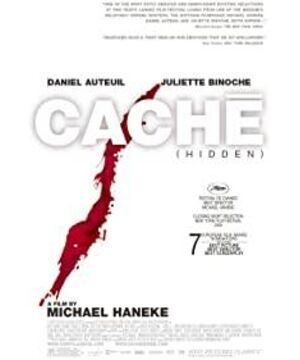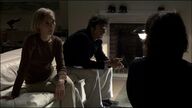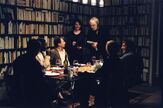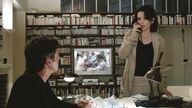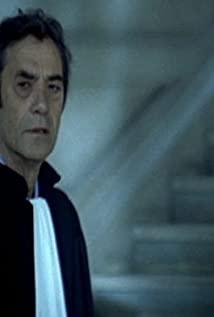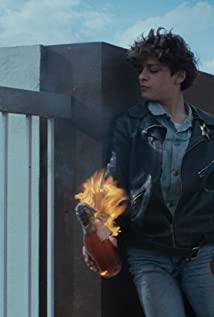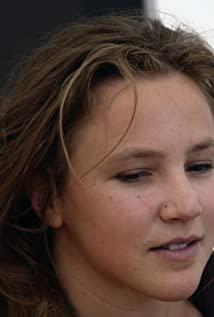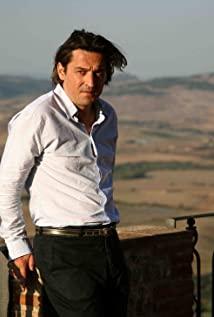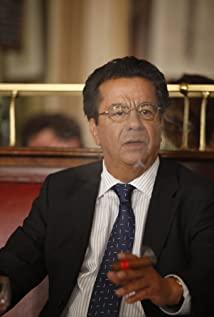movie is "Hidden", and I personally think that only this name can be regarded as the essence of this movie. It may be better translated as hiding, evading, and candid photography.
The film won the 2005 European Film Awards for Best Film and Best Director. Director Michael Halke also won the Best Director and International Film Critics Fabisi Award at the 2005 Cannes Film Festival for this film.
Let's look at the relevant comments first.
The British "Guardian" commented that the film is "The first great film of the twenty-first century" (The first great film of the twenty-first century)
Michael Hannick's masterpiece: a politics of rejection and attention- Psychoanalytical attempt.
---The Guardian,
without pounding the audience's brains, Hannick raises questions of crime, responsibility and complacency with global implications. - BBC
apart from the most patient and adventurous art film viewers looking for intellectual challenge may find this to be a pretentious work of film - if it's a style, it leaves viewers with apathy - stay hidden true meaning. - "British Screen"
The first thing I want to remind you all is, do you have enough patience to watch such a literary movie? If you are not a fan of literary movies or have been in Hollywood blockbusters for too long, then it is best for you not to watch this movie, it will probably only make you confused, dizzy, ignorant, and incomprehensible after watching it. of loss. Let's take a look at the European Film Awards for the best picture of this film. Its purpose is to "permanently establish the artistic spirit of films followed by all European countries, and to awaken the confidence and support of global audiences in European arts and humanities films". Looking at the major European film awards, with the Palme d'Or, the Golden Lion and the Golden Bear as the representatives, you will find that European films are full of more literary interest and humanistic care than the Oscars. The consistent style of literary films is that the rhythm is slow and the stamina is full. In other words, the process of watching a film is a test of the audience's patience, but after watching it, it is full of aftertaste.
Let's talk about my personal interpretation of the film.
1. The camera, who is filming secretly is not the focus of the film, it is just a way and a medium for the director's expression. The focus should not be here.
The film uses the camera to show George's family life and contradictions in the elite class (the incompatibility between children and parents, George's deceit and hypocrisy to his wife). Through George's childhood memories, it shows the complex national contradictions in France, the confrontation between different classes, and the deep-rooted possessiveness and egoism in human nature. After the transition at that time, both George and Majid had grown up. When the incident of "candid photography" suddenly intervened in George's seemingly calm, happy and glamorous life in the middle and upper classes, George was flustered. Hating and slandering Majid, who was in the lower class, poor, marginalized and disadvantaged, George kept asking Majid, "What do you want?" To show innocence!
It's a subtle, hidden, but naked, elitist mentality in life that responds. They are self-righteous, in a powerful position, occupying the power of information and words, but they speculate and doubt others with a despicable thinking, especially the middle and lower classes. When conflicts arise, they feel that they are implicated and swayed by them. They are a burden to society. The purpose of what they do is to deceive and deceive them, trying to obtain benefits from themselves. Why are people in the lower class poor and without a good education, there is no noble sentiment? ! Why should they be suspected, slandered, and even have no chance to defend themselves? !
2. Two kinds of people, two kinds of psychology. The director has always used Majid and his son to satirize people like George. This strong contrast can be clearly felt in the tone, attitude and expression of the two people's conversation. At the end of the film, this irony reaches a climax. Majid commits suicide. The son comes to the TV station to talk to George. The former is the son who has lost his father, calm, calm, objective, and even a little indifferent. The latter is George, who is aloof and has nothing. What he lost, but he seemed panicked. He presumptuously believed that the person in front of him would pose a threat to his family and business. He slandered Majid, and even used threats and force (fight), but Majid's son, just said coldly , "You are very good at threats, aren't you?" "I just want to know how your conscience feels" George scolded, "You and your father are both sick!" In fact, the real sick George.
3. The lack of sense of security in modern society. Let's take a look at the content of the candid shots. It is nothing more than a fragment of the daily life of the George family, some of the things we ordinary people do every day, and there is no secret or privacy at all. Even at the beginning of the movie, it was just a candid shot of some of George's going in and out, which is different from the cameras and monitors all around us. But when such a videotape was sent to George's house, it caused great panic, and George and his wife were facing enemies. In essence, this reflects the lack of sense of security in modern society, the opaqueness and distrust of people-to-people interactions (contacting the George family to conceal and deceive friends), as if we are safe only if we hide ourselves first. In modern society, everyone is hidden under a camera. When the camera has not been discovered, our life is stable, bright and safe. After being discovered, we may become a talking point and a laughing stock in the mouths of others. , lost all psychological comfort.
4. Understanding of politics and culture. The Guardian said it was "a politically-psychoanalytic attempt at rejection and conspicuousness". Through the above analysis, it is not difficult for us to map this mentality to the current political landscape. How similar is this "elite mentality" to the psychology of some great powers and their attitude towards international affairs! Always a high-ranking, indomitable face, accusing disadvantaged nations and countries, and accusing deer as a horse, a discourse power and a cultural power.
5. About the ending of the movie. The movie ends with Majid's son talking to George's son. Some netizens said that this is a supplementary statement, the reason why George's son ran away from home. This understanding makes sense logically, because it makes the whole film a complete whole, no longer has "holes" in one area and no explanation.
In fact, this can also be seen as a response to George when Majid's son and George had a heated quarrel on TV, that is, came to school and told George's son (the next generation, which can map the future) the truth. The truth, exposes George their hypocrisy, fabrication and falsehood.
If you look closely at the end of the movie, you will find that it is not Majid's son and George's son who occupy the center of the screen, but the back of a man with long hair, carrying a bag on his side, and a baggy traveler or photographer. He has been staring straight ahead, but has a thoughtful, waiting look. 1. Here we may speculate that this is a metaphor, that is, an illustration of the overall style of the film. It's calm, objective, contemplative, and thought-provoking. This is not a suspense film, entangled in who is secretly filming, sending those bizarre cards, but a documentary, the director tries to show the complex psychological state of the characters through such an event and map it. 2. At the same time, he has another understanding, a logical explanation. That is to suggest that this man may be the real candid shooter. In fact, it doesn't matter who is the candid shooter, we can even say that the director is the real candid shooter, he is the man with the backpack. What matters is the content, not the means.
View more about Caché (Hidden) reviews


